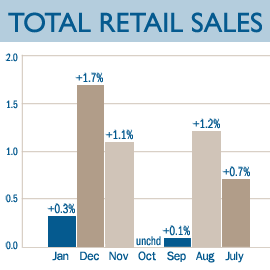|
Retail sales growth slows
|
 |
February 11, 2000: 1:22 p.m. ET
January gains are less than expected, but experts don't see economic slowdown
By Staff Writer M. Corey Goldman
|
NEW YORK (CNNfn) - U.S. retail sales in January rose at a slower pace than the previous month following a massive holiday shopping spree in December. But analysts said the smaller-than-expected gain in sales, reflecting winter storms in the Northeast and the end of Y2K-driven purchases, probably didn't signal a meaningful slowdown of galloping economic growth.
Sales by U.S. retailers rose 0.3 percent in January from a month earlier, the Commerce Department reported Friday, the weakest month-on-month growth rate since October and below the 0.5 percent gain expected by analysts. Excluding purchases of autos, sales declined 0.3 percent, the first drop in two years and the biggest decline since April 1997. Analysts had expected a 0.6 percent increase in that category.
 The lower-than-expected figures follow one of the best holiday shopping seasons on record, according to brick-and-mortar retailers' same-store sales data, Internet retailers' record sales figures, and anecdotal evidence from analysts. The lower-than-expected figures follow one of the best holiday shopping seasons on record, according to brick-and-mortar retailers' same-store sales data, Internet retailers' record sales figures, and anecdotal evidence from analysts.
The Commerce Department revised December's retail sales figure upward to show a 1.7 percent gain, the biggest since 1984, from the 1.2 percent rise initially reported.
At the same time, analysts cautioned that the surprise weakness in January sales, while encouraging from the standpoint of the U.S. economy's chances of avoiding an inflationary boom, might not signal an economic slowdown just yet. Consumer spending accounts for more than two-thirds of U.S. output and has been one of the driving forces behind the record economic expansion. The economy is now in its 107th month of uninterrupted growth.
No slowdown just yet
"Looking forward, we think there is next to no chance these numbers mark the start of a real slowing in consumer spending," said Ian Shepherdson, chief U.S. economist with High Frequency Economics. "The markets will no doubt take comfort from the headlines, but it is temporary relief."
Bonds rose on the news. Investors speculated that any interest-rate increases from the Federal Reserve will be limited in scope as the economy slows from its torrid 5.8 percent fourth-quarter pace. Stocks took the opposite path, as declines in technology shares drove both the Nasdaq Composite and Dow Jones industrial average lower.
 Wayne Ayers, chief economist with Fleet Boston Financial, told CNNfn he wasn't convinced retail sales growth was abating, even with the Fed's recent series of interest-rate increases designed to slow consumer spending and head off a pickup of inflation. (241KB WAV) (241KB AIFF) Wayne Ayers, chief economist with Fleet Boston Financial, told CNNfn he wasn't convinced retail sales growth was abating, even with the Fed's recent series of interest-rate increases designed to slow consumer spending and head off a pickup of inflation. (241KB WAV) (241KB AIFF)
Sales of new cars, which account for about one-quarter of monthly sales, climbed 2.3 percent in January, after rising 1.4 percent in December. Sales at general merchandise stores gained 0.8 percent, slowing from a 1.1 percent rise, and sales at food stores fell 2.2 percent after a 3.2 percent jump the month before - partly reflecting the ending of demand for goods bought as a precaution against Y2K disruptions, according to analysts.
"Some of the December strength and January weakness appears to be related to Y2K precautions; the (Federal Open Market Committee) will need a lot more evidence of a slowdown in consumer spending than this to convince them that further tightening is not warranted," said Steven Wood, an economist with Banc of America Securities in San Francisco.
More rate rises?
The Fed has lifted its trend-setting interest rate four times since June in an effort to slow the economy and keep inflation at bay. Its last move earlier this month came with a warning to investors that a hot labor market and continued growth in consumer spending may lead to further rate increases down the road. The Fed funds rate currently stands at 5.75 percent.
With the U.S. unemployment rate at a generational low, with paper gains from stocks and other investments on the rise and with demand overseas for American-made goods swelling, consumers are more confident than ever, and willing to crack open their checkbooks to spend on new items.
Indeed, other evidence strongly suggests that January was not as subdued a month for retailers as today's report suggests. Same-store sales surged last month as consumers took advantage of post-holiday sales and widespread declines in prices for goods and services. 
|
|
|
|
|
 |

|

